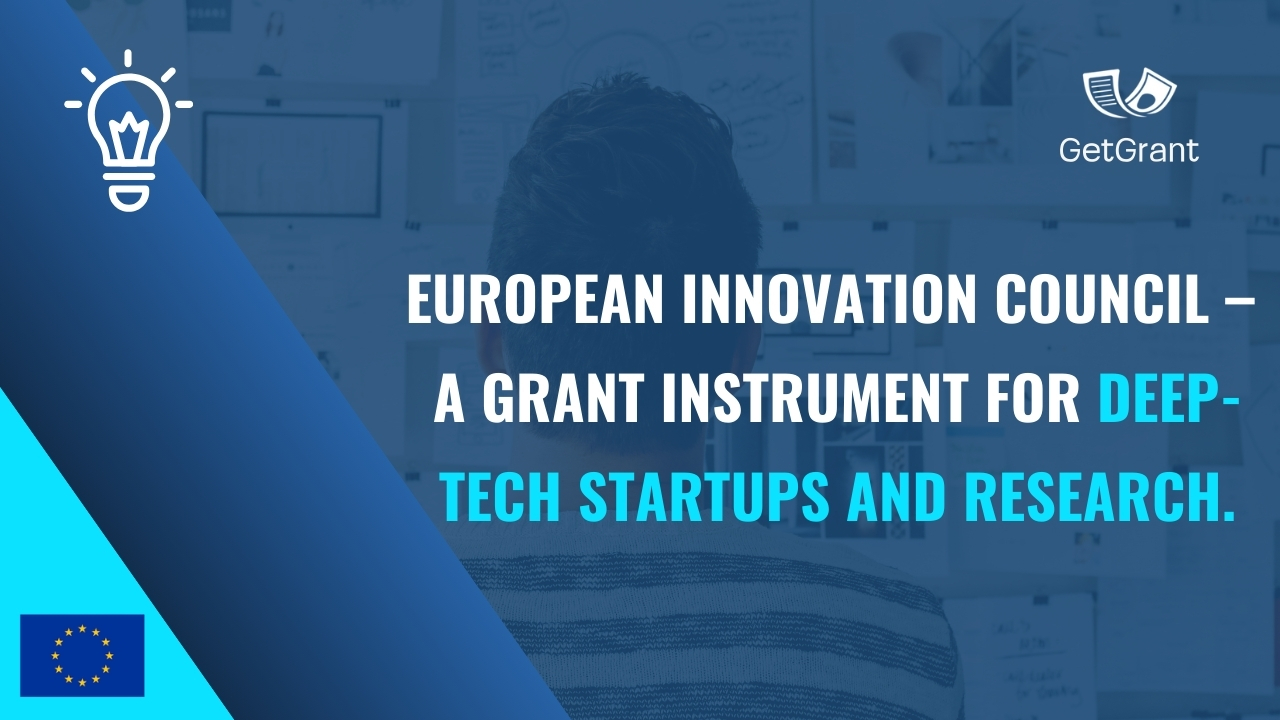The European Innovation Council as the most effective grant instrument for the commercialization of scientific research and the development of knowledge-intensive startups
Competition is intensifying in the world between key technological players — the USA, the EU, China, South Korea and Japan — for leadership in the development of critical technologies within the framework of the fourth technological revolution. The accelerated development of areas such as artificial intelligence, renewable energy, electric vehicles, quantum computers, robotics, biotechnology and space creates a risk of technological lag for many countries.
This threat particularly concerns the European Union, which is often criticized for excessive regulation and the lack of effective institutional and financial mechanisms to support innovation in the private sector. To overcome these challenges and develop breakthrough technologies, the European Innovation Council was established in 2021. Its aim is to promote the commercialisation of cutting-edge research in universities, start-ups and small and medium-sized enterprises, helping them to turn innovative ideas into market-ready companies. This is achieved by providing grant or mixed grant-investment support, selected through an open competition.
After a pilot phase in 2018-2020, it was fully launched in March 2021 under Horizon Europe, the EIC aims to support innovators at all stages of development – from ideation through scientific research to commercialisation and scaling up of a technology business. The main types of organisations eligible for funding are primarily private organisations – namely start-ups and SMEs (small and medium-sized enterprises), as well as research institutes and universities where the relevant technologies are being developed. The focus is on funding the following thematic areas:
- Medical Technology and Biotech
- Climate and Energy
- Digital Technology and Space
- Industrial and Deep Tech
The EIC is unique in that it combines grant funding with direct equity investments in private organisations through the EIC Fund, which allows for comprehensive support for innovators. The EIC is guided and strategically overseen by an independent board comprising entrepreneurs, researchers, investors and other representatives of the innovation ecosystem. The EIC’s programmes and initiatives are implemented by the Executive Agency for Innovation and Small and Medium-sized Enterprises (EISMEA).
The EIC also actively cooperates with the following institutions:
1) European Institute of Innovation and Technology (EIT): The EIC and the EIT have signed a Memorandum of Understanding to join forces to support innovators, start-ups and small and medium-sized enterprises (SMEs) in Europe. The cooperation includes mutual access to advisory services and networks, joint support for women innovators and regions with less innovation activity, as well as sharing data on supported startups and SMEs.
2) Ukrainian Startup Fund (USF): USF became the first partner from Ukraine under the EIC Ecosystem Partnerships and Co-Investment Support program. This partnership promotes the development of Ukrainian startups and their integration into the European innovation ecosystem.
The European Innovation Council (EIC) has funded thousands of innovation projects since the beginning of the pilot phase in 2018. During the pilot 2018-2020, the EIC supported over 430 cutting-edge science and technology projects (under the Future and Emerging Technologies direction) and over 5,700 startups and SMEs.
Following the official launch of the full EIC under Horizon Europe (2021-2027), around 500 startups (EIC Accelerator), 275 research projects (EIC Pathfinder) and 140 research commercialisation projects (EIC Transition) have been funded by the end of 2023. This brings the total number of innovation initiatives supported by the EIC to over 6-7 thousand, including all funded startups, SMEs and research consortia.
The total amount of funding that has been or is planned to be provided by the EIC is also significant. In the pilot phase 2018-2020, the EIC budget was around €2.7 billion, designed to fund ~1000 projects. €10.1 billion has been allocated to the EIC under Horizon Europe 2021-2027. As of 2024, a total of over €5 billion in calls and funding has been launched and allocated (for 2021-2023 alone), and this funding is attracting even greater private investment. In particular, the portfolio of companies supported by the EIC has reached a combined market value of almost €70 billion (as of 2023), the sum that is €20 billion more than two years ago.
The EIC portfolio already includes 8 unicorns (companies valued at over $1 billion) and over 150 centaurs (startups valued at over $100 million).
The EIC implements its support through three main funding instruments: the EIC Accelerator (for start-ups and SMEs with a technology readiness level of 6-8), the EIC Pathfinder (for early-stage R&D projects with breakthrough potential and with a technology readiness level of TRL 1–3) and EIC Transition (to transform TRL 1–3 research results into innovative solutions of TRL 4–6). In 2024, a fourth instrument appeared – STEP (Strategic Technologies for Europe Platform), created to scale companies with critical technologies in already created products (TRL 8–9). Historically, the largest share of EIC funds goes to Accelerator, while Pathfinder and Transition receive smaller shares.
On average, about 70% of the annual EIC budget goes to the Accelerator program. For example, in 2022, out of the €1.7 billion of the EIC budget, €1.16 billion was allocated to grants and investments under the EIC Accelerator program; in 2023, out of €1.6 billion, €1.13 billion. EIC Pathfinder typically receives around 20–22% of the funds (e.g. €350 million in 2022 and €343 million in 2023), while EIC Transition receives around 8–10% (≈€131 million in 2022, €128 million in 2023).
| Year | Annual EIC budget | EIC Accelerator | EIC Pathfinder | EIC Transition | EIC STEP |
| 2022 | €1,7 B | €1,16 B | €350 M | €131 M | |
| 2023 | €1,6 B | €1,13 B | €343 M | €128,3 M | |
| 2024 | €1,2 B | €675 M | €256 M | €94 M | €150 M |
| 2025 | €1,4 B | €634 M | €262 M | €98 M | €300 M |
EIC Pathfinder

The EIC Pathfinder aims to support risky, cutting-edge research at an early stage of its development that can form the basis for breakthrough technologies.
The main features of EIC Pathfinder cover technological suitability, financial support, applicant requirements, funding streams, portfolio approach, support services and additional opportunities.
Technological suitability concerns ideas, research and development at early technological readiness levels (TRL 1-3), facilitating the progression from idea to ‘Proof of Concept’ level and further assessing the potential to create new commercially viable technologies. The programme also places a strong emphasis on interdisciplinary research and partner consortiums.
Financial support includes grants of up to €4 million to support the early stages of development of future technologies (TRL 1-3), up to the proof-of-concept stage, additional funding to test the innovative potential of research results, and the possibility of further funding through other EIC instruments, as discussed in more detail below in the article, such as EIC Transition or EIC Accelerator, to support further stages of development and commercialisation of technologies.
Applications may be submitted by consortia of at least three independent legal entities registered in different EU Member States or countries associated with Horizon Europe, as well as by individual applicants or small consortia (two partners) under the EIC Pathfinder Challenges sub-programme. Participants may include universities, research institutions, small and medium-sized enterprises, and under certain conditions, large companies and other organisations with relevant expertise.
Within the EIC Pathfinder, there are two sub-programmes:
- EIC Pathfinder Open, which supports projects in any field of science, technology or applications without defined thematic priorities, with grants of up to €3 million;
- EIC Pathfinder Challenges, targeting specific thematic areas to achieve specific objectives, with grants of up to €4 million.
The portfolio approach involves collaboration between different projects, initiated and facilitated by EIC managers.
Support services include access to business acceleration services, coaching, mentoring, networking and partnership opportunities with corporates and investors, and assistance in developing go-to-market plans.
Additional opportunities include the Fast Track scheme, which allows for a special consideration of applications from existing Horizon Europe projects (link here), and the Hop on Facility, which allows research institutions from “new” European countries to join existing projects within the EIC Pathfinder and Horizon Europe Pillar 2 (link here). It should be noted that these additional opportunities also apply to other EIC programmes.
The total budget of the programme for 2025 is €343 million.
EIC Transition
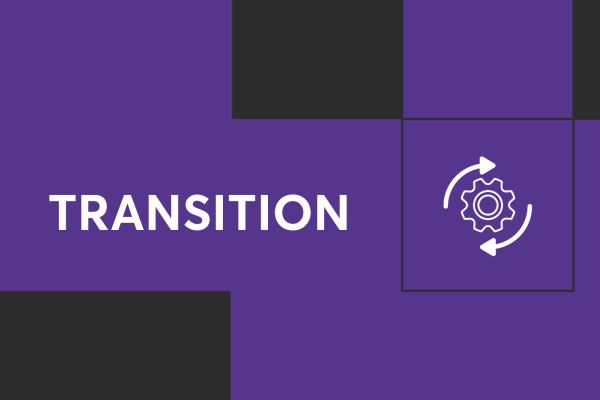
EIC Transition aims to support the transition from verified scientific research that has reached the Proof of Concept stage to the prototype stage of innovative products with high commercial potential. This programme therefore targets technologies that have reached the TRL 4-6 technology readiness level, with a view to their further technological progression, namely the creation of prototypes and pilot products, with preparation for market entry. This programme is a key link between research (EIC Pathfinder level) and commercialisation of developed technologies, helping research teams to move to higher TRL levels and ensure success in the markets.
Financial support includes grants of up to €2.5 million, which can be used to carry out technical development of a prototype, analyse market prospects, optimise business plans and develop a roadmap for market entry. In addition, booster grants of up to €50,000 can be used to test market potential, analyse additional commercialisation pathways or finance portfolio activities.
Financial support includes grants of up to €2.5 million, which can be used to carry out technical prototype development, analyze market prospects, optimize business plans and develop a roadmap for entering the market. In addition, booster grants of up to €50,000 can be used to test market potential, analyze additional commercialization paths or finance portfolio activities.
Applications are open to small and medium-sized enterprises (SMEs), start-ups, spin-offs, universities and research organisations. An important condition is previous participation in EIC Pathfinder, FET or other Horizon Europe research programmes, the results of which have reached TRL 3-6.
There are two sub-programmes within the EIC Transition:
- EIC Transition Open supports proposals without restrictions on the topic. The frequency of applications is twice a year, and the earliest deadline is 1 July 2025.
- EIC Transition Challenges aims to fund projects in clearly defined thematic areas. The frequency of applications is once a year, with the next deadline being 18 December 2025.
Support services include business strategy development and optimization of marketing plans, mentoring from leading technology and business experts, access to market analysts to improve market positioning, and assistance in finding additional funding and creating partnerships.
Additional opportunities include projects that successfully pass the EIC Transition have the opportunity to receive further funding through the EIC Accelerator programme.
The total budget of the programme for 2025 is €98 million.
EIC Accelerator
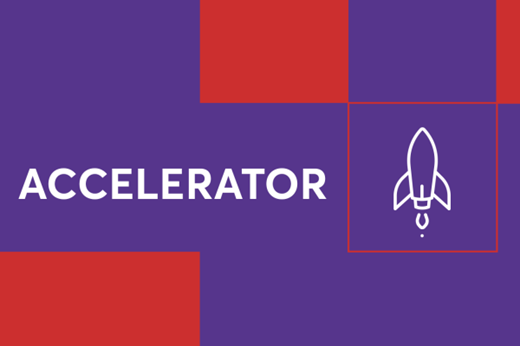
The EIC Accelerator aims to support start-ups and small and medium-sized enterprises (SMEs) with advanced products at TRL 6-8 (i.e., with working prototypes), with a focus on creating new markets or transforming existing ones, both in Europe and globally.
Financial support will take the form of various forms of funding, with grants of up to €2.5 million as the main mechanism. At TLR 9, additional equity-based investments of between €0.5 and €10 million are possible through the EIC Fund for scale-up. The programme also offers blended finance, which combines a grant component with direct or quasi-equity, for example through convertible loans.
Applications can be submitted by individual start-ups and SMEs established in EU Member States or Horizon Europe associated countries. Small and medium-sized enterprises (up to 499 employees) can only apply for equity support. Individuals who are only planning to create an SME are also eligible to participate in the program.
The application process consists of several stages:
- Short application: submission of a short form, which includes a description of the innovation, potential market, information about the team; presentation slide deck (up to 10 slides) and a three-minute video demonstrator. The response is provided within 4-6 weeks.
- Full application: if the short application is approved, it is necessary to prepare a full application with a business plan, as well as provide additional information on the company’s ownership structure and the presence of patents. The response is provided within 8-9 weeks. The proposals are assessed remotely by three EIC expert evaluators. Deadlines are March 12 and October 1, 2025.
- Interview: in case of successful completion of the previous stages, the team is invited to an interview with the EIC jury. It is held 4-5 weeks after the announcement of the results of the previous stage, and the results will be available in 2-3 weeks.
- Grant or investment component: if only a grant is selected, an agreement is signed and the first tranche is provided. The co-financing rate is 70%, 30% can be covered by blended venture financing from the EIC Fund’s associated capital.
On average, 15-20% of applications that have passed the second selection stage receive grant financing.
Support services include access to business acceleration, coaching, mentoring, expertise and training. The programme offers opportunities for networking and partnerships through dedicated platforms with investor databases, as well as access to innovation ecosystems and non-financial services.
There are two sub-programmes within the EIC Accelerator:
- EIC Accelerator Open: supports innovations in any field without defined thematic priorities. Budget for 2025 is €384 million.
- EIC Accelerator Challenges: focuses on innovations that solve specific challenges in line with EU priorities. Budget for 2025 – €250 million.
The total budget of the programme for 2025 is €634 million.
STEP (Scale-Up Platform Europe)
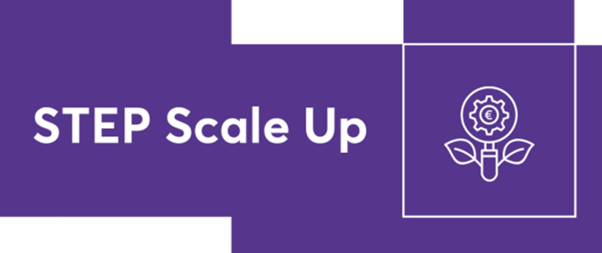
The STEP (Strategic Technologies for Europe Platform) programme, established in 2024, aims to support Europe’s strategic technology sectors that are critical to the EU’s economic and technological independence. The programme’s strategic objective is to create technological sovereignty in Europe. The programme aims to ensure the scaling of innovation, bridge the investment gap and reduce Europe’s dependence on external suppliers in key sectors.
The programme focuses on technologies that have reached a technological level of TRL 8-9, i.e. those that are ready and in need of scaling up.
Financial support under the STEP programme includes Equity investments of between €10 and €30 million provided through the EIC fund for market deployment and scaling up. The overall budget of the programme for 2025 is €300 million, with a potential increase to €900 million in the period 2025-2027.
Small and medium-sized enterprises (SMEs), start-ups, scale-ups with ready-made products and ready to scale up their business are eligible to participate in the programme. Large enterprises, especially under vertical programmes or cohesion funds, can participate provided that they implement strategic projects in less developed or transition regions of the EU.
The programme provides for additional opportunities, including the award of the “Sovereignty Seal” for projects that meet the objectives of the STEP.
EIC and Ukraine
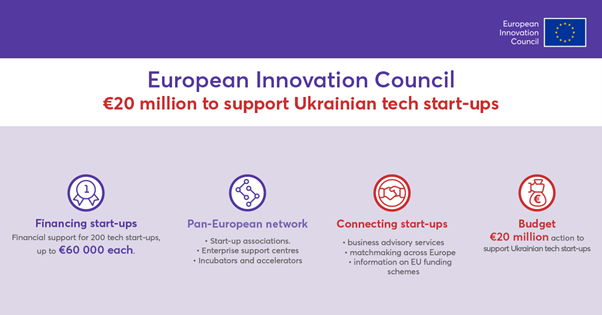
In Ukraine, there is a systemic problem of the lack of mechanisms for the commercialization of scientific developments. Most scientific developments are localized on the basis of the Research Institutes of the National Academy of Sciences of Ukraine and universities, and they receive insufficient funding from the state budget. This has led to a large reduction in the number of employees and an outflow of personnel to the private sector, for example, the IT industry, aging of personnel, stagnation of the material and technical base. The situation is partially solved by the availability of state grant funding (for example, through the National Research Foundation of Ukraine) and partner foreign grant funding. An additional fundamental mechanism could be the introduction of mechanisms for the commercialization of scientific developments, through market analysis of the technologies being developed, validation of concepts and the creation of startups. In 2023, about 200 developments suitable for the further commercialization were identified in Research Institutes of the National Academy of Sciences of Ukraine, of which only 1 initiative took steps towards actual commercialization.
Given the fact that Ukraine is an associated member of the European Union, Ukrainian organizations have the right to apply for the EIC competitions. Also, as already noted, since the first half of 2023 there has been direct cooperation between the Ukrainian Startup Fund (USF) and the EIC.
The key initiative of this collaboration was the Seeds of Bravery program, aimed at supporting diverse Ukrainian startups with a total budget of 20 million euros. Applications were opened from November 2023 and continued until January 27, 2025. Within six different sub-programs, startups could receive funding of up to 60 thousand euros, and in total, 200 startups are expected to be supported.
In addition to funding, the program provides participation in various workshops that promote the development of business skills, such as developing market strategies, product creation, market segmentation, determination of the target audience, marketing strategies, sales strategies and others.
In addition to strengthening Ukrainian startups through the provision of additional funding, this program also provides incentives for further participation of Ukrainian startups in the EIC Accelerator competition.
At the moment, there is no approved funding for the continuation of this program, or information in the public domain about subsequent similar programs.
Also, several Ukrainian startups are also winners of the EIC Accelerator. For example, Carbominer is a Kyiv-based climate technology startup specializing in the development of carbon capture technologies to reduce the carbon footprint of waste. The startup received a grant from the EIC Accelerator Fund in the amount of 1.5 million euros, and the right to receive up to 7.5 million euros of investment capital in the next stages of the project.
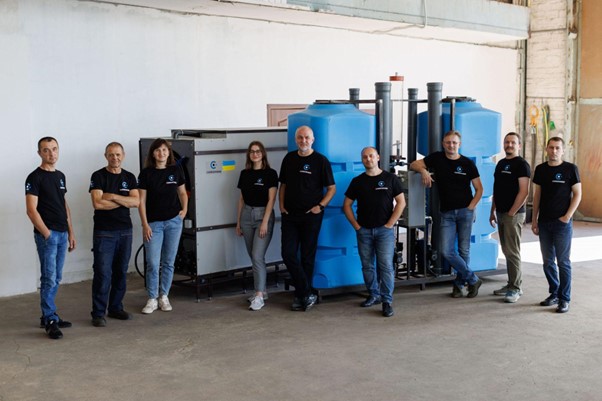
The Carbominer team in front of carbon dioxide capture devices.
The second example is Releaf Paper, a Ukrainian eco-startup that has developed a unique technology for producing paper from fallen leaves. Their technology allows for a significant reduction in the use of wood for paper production. In December 2022, the company received a grant from the EIC Accelerator for 2.5 million euros, which made it possible to build two new production complexes in Europe.
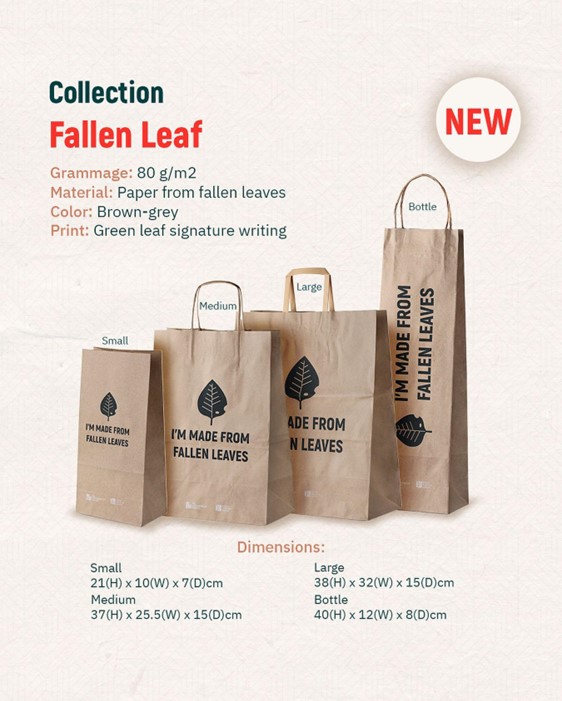
Packages produced by Releaf Paper
Conclusion
The European Innovation Council is a key tool for stimulating innovation in Europe, which not only provides comprehensive financial support at all stages of the development of technological projects, but also creates a powerful ecosystem for the commercialization of scientific research. The EIC Accelerator, Pathfinder, Transition and STEP programmes aim to strengthen the EU’s ability to compete effectively in the global market by investing billions of euros and enhancing the emergence of market-competitive companies, including unicorns and centaurs. The EIC is therefore not only a funding mechanism but also a strategic tool for shaping Europe’s innovative future, bridging the gap between scientific achievements, prototyping and business acceleration to create a new economy that can meet the standards of the fourth technological revolution. Given the significant but under-appreciated technical potential in Ukraine, there is an urgent need to disseminate information about the EIC’s grant mechanisms for the commercialisation of scientific developments. Such work, as well as further support in the application process, should be carried out among leading scientific groups in Ukrainian Higher Education Institutions and Research Institutes of the National Academy of Sciences of Ukraine.
